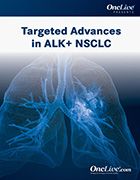Publication
Video
Dr. Saxena on the Importance of Initial Treatment Selection in ALK+ NSCLC
Ashish Saxena, MD, PhD, discusses the importance of initial therapy selection in ALK-positive non–small cell lung cancer.
Ashish Saxena, MD, PhD, assistant attending physician, NewYork-Presbyterian Hospital, assistant professor of medicine, Weill Cornell Medical College, discusses the importance of initial therapy selection in ALK-positive non­—small cell lung cancer (NSCLC).
Patients will eventually develop resistance to ALK inhibitors, says Saxena. Secondary mutations may develop as a result of insufficient suppression of ALK or bypass pathways.
Specific secondary mutations that may arise following treatment with crizotinib (Xalkori) or alectinib (Alecensa) are sensitive to next-generation agents such as brigatinib (Alunbrig) and lorlatinib (Lorbrena).
As such, optimizing first-line treatment selection is necessary as it may influence which agents are available to the patient upon disease progression, concludes Saxena.










